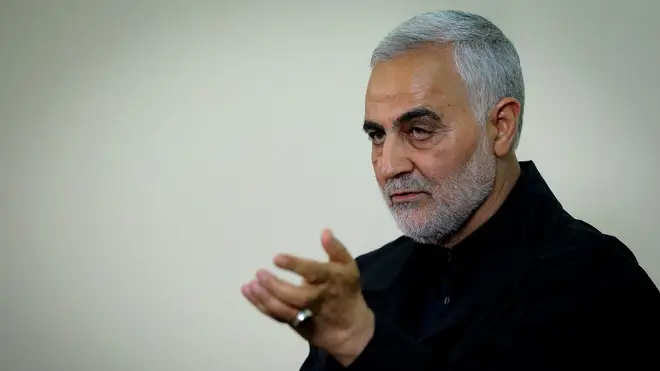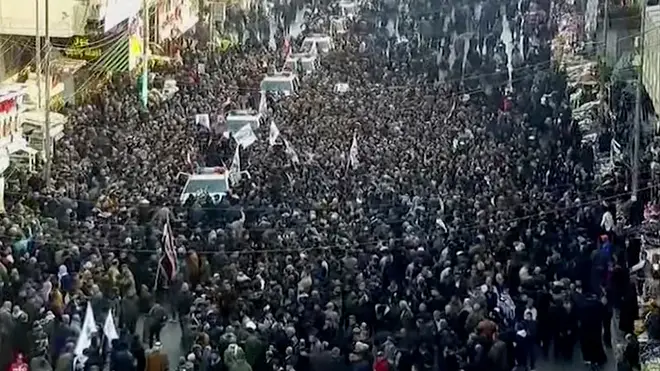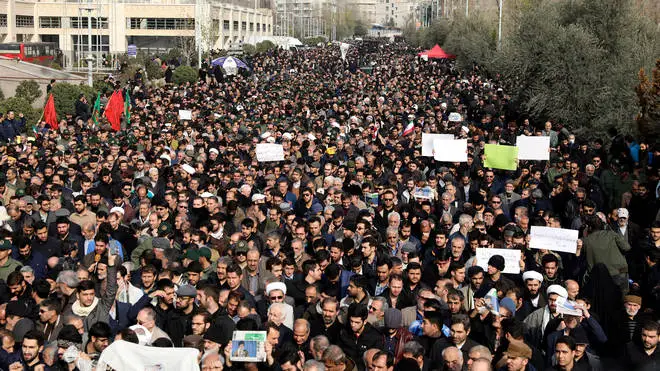
Iain Dale 7pm - 10pm
4 January 2020, 10:41 | Updated: 4 January 2020, 10:47

British nationals have been warned against travelling to Iran and Iraq amid escalating tensions after the US killed Iranian General Qassem Soleimani.
The Foreign Office has warned against all travel to large swathes of Iraq and all but essential travel to Iran after the fatal drone strike on Friday.
They have also advised those in the region to "remain vigilant" after the United States announced it was sending nearly 3,000 extra troops to the Middle East.
Travel advice updated on Saturday morning urged Britons against all travel to Iraq outside the Kurdistan region, and for those there already to consider fleeing by commercial means.
The warning came as thousands began to gather on the streets of Iraq for the funeral of General Soleimani, who was killed at Baghdad's international airport.

The Foreign Office's advice also cited violent demonstrations outside the US embassy in Baghdad at the turn of the new year and warned further protests could take place.
Britons in the region were being urged to "remain vigilant and monitor the media carefully".
Foreign Secretary Dominic Raab said the updated advice was issued due to "heightened tensions in the region" and would be kept under review.
"The first job of any government is to keep British people safe," he added.
General Soleimani was head of Iran's elite Quds Force and masterminded Tehran's regional security strategy.
The FCO now advise against all travel to #Iraq, except for the Kurdistan Region of Iraq where the FCO continue to advise against all but essential travel. Read more: https://t.co/BIQxihWK3E pic.twitter.com/XcfskUTbSU
— FCO travel advice (@FCOtravel) January 4, 2020
US President Donald Trump said he ordered the strike to prevent the outbreak of war, but Iran was threatening harsh retaliation.
Amid fears wider conflict could break out, an American official denied the US was behind a second deadly air strike on two vehicles being reported north of Baghdad.
President Trump continued with his rhetoric despite widespread calls for calm, saying that General Soleimani's "reign of terror is over" and describing him as having a "sick passion" for killing.
Former foreign secretary Jeremy Hunt warned of the peril being faced after recent "extreme" actions by both the US and Iran, which have simmered since Mr Trump tore up a nuclear deal between the nations.
He said: "Well it's an incredibly dangerous game of chicken that's going on at the moment, because both sides have calculated that the other side cannot afford, and doesn't want, to go to war.”

Mr Hunt warned the tensions created a "very difficult situation" for the UK as an ally of the States, saying Britain "cannot afford to be neutral".
"But this is a very, very risky situation, and I think the job that we have to do as one of the US's closest allies is to use our influence to argue for more consistent US policy," he added.
Although not confirmed by the Government, there has been criticism of the US for apparently not giving warning of the attack to the UK, which has hundreds of troops deployed in Iraq.
Mr Hunt said a failure to notify would be "regrettable" because allies should ensure "there are no surprises in the relationship".
Boris Johnson has been on holiday on the private Caribbean island of Mustique. He has not commented on the general's killing and Number 10 has not said when he will return.
Outgoing Labour leader Jeremy Corbyn wrote to the PM calling for an urgent meeting of the Privy Council in part to discuss whether the "assassination" had heightened the terror risk to the UK.
"The UK Government should urge restraint on the part of both Iran and the US, and stand up to the belligerent actions and rhetoric coming from the United States," Mr Corbyn had warned.
"All countries in the region and beyond should seek to ratchet down the tensions to avoid deepening conflict, which can only bring further misery to the region, 17 years on from the disastrous invasion of Iraq."